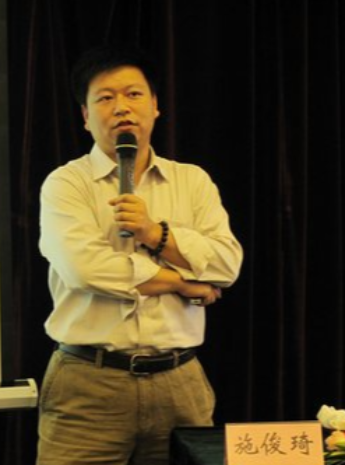姓名:施俊琦 性別:男 浙江桐鄉(xiāng)人,1976年11月生。
浙江大學(xué)管理學(xué)院求是特聘教授。曾任中山大學(xué)嶺南(大學(xué))學(xué)院管理學(xué)教授,北京大學(xué)心理學(xué)系副教授。北京大學(xué)心理學(xué)系應(yīng)用心理學(xué)專業(yè)博士(2004),從事應(yīng)用心理學(xué)的教學(xué)和科研工作。美國(guó)心理學(xué)會(huì)會(huì)員,美國(guó)人力資源協(xié)會(huì)會(huì)員,中國(guó)心理學(xué)會(huì)會(huì)員。2002年5月赴美國(guó)加州大學(xué)伯克利分校短期訪問(wèn)。2011年3月-2012年3月赴美國(guó)馬里蘭大學(xué)訪問(wèn)學(xué)者。
國(guó)家自然科學(xué)基金委杰出青年基金獲得者,珠江學(xué)者特聘教授,教育部長(zhǎng)江學(xué)者青年學(xué)者。
獲獎(jiǎng)情況:
2013年入選教育部“新世紀(jì)優(yōu)秀人才計(jì)劃”。
2014年獲得國(guó)家自然科學(xué)基金委杰出青年基金項(xiàng)目。
2014年中山大學(xué)嶺南學(xué)院杰出科研貢獻(xiàn)獎(jiǎng)一等獎(jiǎng)
2015年擔(dān)任國(guó)際期刊Work, Aging and Retirement(牛津大學(xué)出版社)創(chuàng)刊副主編(SSCI雜志)
2015年擔(dān)任管理學(xué)頂級(jí)期刊 Journal of Applied Psychology編委(Editorial Board)(大陸地區(qū)唯一編委)
2015年廣東省“珠江學(xué)者特聘教授”(工商管理學(xué)科)
2015年中山大學(xué)嶺南學(xué)院杰出教學(xué)貢獻(xiàn)獎(jiǎng)一等獎(jiǎng)
2016年教育部“長(zhǎng)江學(xué)者”青年學(xué)者
2017年擔(dān)任國(guó)際期刊Academy of Management Discoveries雜志副主編
2017年中山大學(xué)嶺南學(xué)院杰出科研貢獻(xiàn)獎(jiǎng)一等獎(jiǎng)
2018年中山大學(xué)嶺南學(xué)院杰出教學(xué)貢獻(xiàn)獎(jiǎng)一等獎(jiǎng)
主要研究領(lǐng)域:
組織行為學(xué)課題:情緒勞動(dòng)、職業(yè)壓力、職業(yè)枯竭和領(lǐng)導(dǎo)力等題目
主要教授的課程:
本科生:消費(fèi)與營(yíng)銷心理學(xué) 應(yīng)用社會(huì)心理學(xué)
研究生及MBA:人力資源管理 人事選拔與招聘 高級(jí)心理統(tǒng)計(jì) 決策心理與企業(yè)管理
博士生:組織行為學(xué)前沿進(jìn)展
參與完成國(guó)家自然科學(xué)基金項(xiàng)目:
國(guó)家自然科學(xué)基金應(yīng)急項(xiàng)目——證券投資者心理特征與行為的研究(項(xiàng)目號(hào)70041036),項(xiàng)目成員
國(guó)家自然科學(xué)基金青年項(xiàng)目——品牌態(tài)度的內(nèi)隱測(cè)量及其影響因素(項(xiàng)目號(hào)70602006),項(xiàng)目主持人和負(fù)責(zé)人
國(guó)家自然科學(xué)基金重點(diǎn)項(xiàng)目——行為金融學(xué)心理學(xué)子課題的研究(項(xiàng)目號(hào)70432002),項(xiàng)目成員,負(fù)責(zé)實(shí)驗(yàn)設(shè)計(jì)和數(shù)據(jù)分析
國(guó)家自然科學(xué)基金創(chuàng)新團(tuán)隊(duì)——行為金融:心理偏差、投資行為與資產(chǎn)定價(jià)(項(xiàng)目號(hào):71021001),項(xiàng)目成員
衛(wèi)生部科技支撐計(jì)劃——重點(diǎn)職業(yè)人群壓力和職業(yè)枯竭的評(píng)價(jià)體系(項(xiàng)目號(hào):2009BAI177B04)項(xiàng)目成員——主要負(fù)責(zé)研究的設(shè)計(jì)
國(guó)家自然科學(xué)基金集成項(xiàng)目——基于“情景-應(yīng)對(duì)”的國(guó)家應(yīng)急平臺(tái)體系基礎(chǔ)科學(xué)問(wèn)題集成升華研究平臺(tái)(項(xiàng)目號(hào):91024032)——項(xiàng)目成員
國(guó)家杰出青年基金——領(lǐng)導(dǎo)力與團(tuán)隊(duì)績(jī)效(項(xiàng)目號(hào):71425004),項(xiàng)目負(fù)責(zé)人
主持完成的國(guó)家社會(huì)科學(xué)基金項(xiàng)目:
國(guó)家社科基金青年項(xiàng)目——大學(xué)生求職行為的追蹤研究(項(xiàng)目號(hào):09CSH028),項(xiàng)目主持人和負(fù)責(zé)人
教育及工作背景:
◆ 1995年9月-1999年7月(學(xué)士)
北京大學(xué)心理學(xué)系,理學(xué)學(xué)士
◆ 1999年9月-2004年6月(碩博連讀)
北京大學(xué)心理學(xué)系,應(yīng)用心理學(xué)專業(yè)(經(jīng)濟(jì)心理學(xué)方向),獲博士學(xué)位
◆ 2004年7月—2012年7月
北京大學(xué)心理學(xué)系講師、副教授,博士生導(dǎo)師
◆ 2012年8月至今
中山大學(xué)嶺南(大學(xué))學(xué)院教授,博士生導(dǎo)師
◆ 2011年4月-2012年5月 Cornell大學(xué)Smithers研究院research
fellow
已發(fā)表論文及著作:
(1)
頂級(jí)雜志論文:
1.
Koopmann, J., Johnson, R.
E., Wang, M., Lanaj, K., Wang, G., & Shi,
J. (2019). A self-regulation perspective on how and when regulatory
focus differentially relates to citizenship behaviors. Journal of
Applied Psychology, 104(5), 629.
2.
Liu, S., Bamberger, P.,
Wang, M., Shi, J., &
Bacharach, S. B. (2019). When onboarding becomes risky: Extending social
learning theory to explain newcomers’ adoption of heavy drinking with
clients. Human Relations, doi:0018726719842653.
3.
Burmeister, A., Li, Y.,
Wang, M., Shi, J., & Jin, Y.
(2019). Team knowledge exchange: How and when does transformational leadership
have an effect? Journal of Organizational Behavior, doi:10.1002/job.2411.
4.
Song, Y., Liu, Y., Wang,
M., Lanaj, K., Johnson, R. E., & Shi,
J. (2018). A social mindfulness approach to understanding
experienced customer mistreatment: A within-person field experiment. Academy
of Management Journal, 61(3), 994-1020. (Corresponding author)
5.
Zhou,
L., Wang, M., Chang, D., Liu, S., Zhan, Y., & Shi, J. (2017) Commuting
stress process and self-regulation at work: Moderating roles of daily task significance,
family interference with work, and commuting means efficacy. Personnel Psychology, 70(4), 891-922. (Corresponding author)
6.
Liu, Y., Song, Y., Koopmann, J., Chang, D., Wang, M., & Shi, J.
(2017) Eating your feelings? Testing a model of employees'
work-related stressors, sleep quality, and unhealthy eating. Journal of
Applied Psychology, 102(8), 1237-1258.
(Corresponding author)
7.
Song, Y., Liu, Y., Shi,
J., & Wang, M. (2017) Use of proactive tactics and socialization
outcomes: a latent growth modeling approach to understanding newcomer
socialization process. Academy of Management Discoveries, 3(1), 42-63.
8.
Baranik, L., Wang, M., & Shi, J. (2017) Customer mistreatment, employee health, and job performance: cognitive
rumination and social sharing as mediating mechanisms. Journal of Management, 43(4), 1261-1282.
(corresponding author)
9.
Hu, J., Jiang, K., Mo, S., Chen, H., & Shi. J. (2016) The motivational
antecedents and performance consequences of corporate volunteering: When do
employees volunteer and when does volunteering help versus harm work
performance? Organizational Behavior and Human Decision Process.137, 99-111.
10.
Koopmann, J.,
Lanaj, K., Wang, M., Zhou, L., & Shi,
J. (2016). Nonlinear effects of team tenure on team psychological
safety climate and climate strength: Implications for average team member performance. Journal
of Applied Psychology, 101(7), 940-957. (Corresponding author)
11.
Venkataramani, V., Zhou, L., Wang, M., Liao,
H., & Shi, J. (2016) Social
networks and employee voice: The influence of team members’ and team leaders’
social network positions on employee voice. Organizational Behavior and
Human Decision Process. 132. 37-48.
12.
Zhan, Y., Wang, M., & Shi, J. (2016) Interpersonal process
of emotional labor: The role of negative and positive customer treatment. Personnel
Psychology, 69(3), 525-557.
13.
Cheung, S. Y., Gong, Y., Wang, M., Zhou, L.,
& Shi, J. (2016). When and
how does functional diversity influence team innovation? The mediating role of
knowledge sharing and the moderation role of affect-based trust in a team. Human
Relations, 69(7), 1507-1531.
14.
Zhan, Y., Wang, M., & Shi, J. (2015) Retirees'
Motivational orientation and bridge employment: Testing the moderating role of
gender. Journal of Applied Psychology. 100, 1319–1331. (co-corresponding
author)
15.
Hu, X., Shi,
J. (2015) Employees’ surface acting in interactions with leaders and
peers. Journal of Organizational Behavior. 36(8), 1132-1152.
16.
Liu, S., Aleksandra, L., Zhou., L., Shi, J., & Wang., M. (2015) Overqualification
and counterproductive work behaviors: Examining a moderated mediation model. Journal
of Organizational Behavior. 36(2), 250–271.
17.
Liu, Y., Wang, M, Shi,
J., Zhou, L., & Shao, R.(2015) Work-family conflict, emotional exhaustion,
and displaced aggression toward others: the moderating roles of workplace interpersonal
conflict and perceived managerial family support. Journal of Applied
Psychology. 100(3), 793–808. (co-corresponding author)
18.
Liu, S., Wang, M., Bamberger, P, & Shi, J., Bacharach, S. (2015). The dark side of socialization: a longitudinal
investigation of newcomer alcohol use. Academy of Management Journal. 58(2), 334–355. (co-corresponding author)
19.
Liu, S., Wang, M., Liao, H., & Shi, J. (2014). Self-regulation during
job search: the opposing effects of employment self-efficacy and job search behavior
self-efficacy. Journal of Applied Psychology. 99(6), 1159-1172.
(co-corresponding author)
20.
Wang, M., & Shi,
J. (2014) Psychological research on retirement. Annual Review of
Psychology. 65, 209-233.
21.
Wang, M., Gong, Y., Liao, H., Shi, J., & Kammeyer-Mueller, J. D.
(2013) Can't get it out of my mind: Employee rumination after customer mistreatment
and negative mood in the next morning. Journal of Applied Psychology. 98(6), 989-1104. (co-corresponding author)
22.
Shi,
J., Johnson, R. E., Liu, Y., & Wang, M. (2013).
Linking subordinate political skill to supervisor dependence and reward
recommendations: A moderated mediation model. Journal of Applied Psychology.
98(2), 374-384.
23.
Zhang, Z., Wang, M., & Shi,
J. (2012).
Leader-Follower Congruence in Proactive Personality and Work Outcomes: The
Mediating Role of Leader-Member Exchange. Academy of Management
Journal, 55(1), 111-130. (co-corresponding
author)
24.
Zhou,
L., Wang, M., Chen, G., & Shi, J.
(2012). Supervisors' upward exchange relationships and subordinate outcomes:
testing the multilevel mediation role of empowerment. Journal of Applied
Psychology. 97(3), 668-680. (corresponding author)
25.
Wang,
M., Liao, H., Zhan, Y., & Shi, J.
(2011). Daily Customer Mistreatment and Employee Sabotage against Customers: Examining
Emotion and Resource Perspectives. Academy of Management Journal.54(2), 312-334.
(co-corresponding author,
IF 6.079)
26.
Wang,
M., Liu, S., Zhan, Y., & Shi, J.
(2010). Daily Work-Family Conflict and Alcohol Use: Testing the Cross-Level
Moderation Effects of Peer Drinking Norms and Social Support. Journal of
Applied Psychology. 95(2), 377-386. (co-corresponding author)
27.
Liu,
S., Wang, M., Zhan, Y., & Shi, J.
(2009). Daily Work Stress and Alcohol Use: Testing the Cross-Level Moderation
Effects of Neuroticism and Job Involvement? Personnel Psychology. 62(3),
573-595. (co-corresponding author)
28.
Huang, Y., Wang, L., & Shi, J. (2009). When do objects become
more attractive? The individual and interactive effects of choice and ownership
on object evaluation. Personality and Social Psychology Bulletin. 35(6),
713-722. (co-corresponding author)
(2)其他SCI和SSCI文章
29.
Li, Z., Wang, L., Shi, J.,
& Shi, W (2006). Support for Exclusionism as an Independent Dimension of
Social Dominance Orientation in Mainland China. Asia Journal of Social Psychology. 9(3), 203-209.
30.
Wang,
L., Chen, Y., & Shi, J.
(2007). Attitudes toward computers: a new attitudinal dimension. Cyberpsychology and
behavior.10(5),
700-704
31.
Shi,
J., & Wang, L (2007). Validation of emotional intelligence scale in
Chinese university students. Personality and individual differences. 43(2),
377-387.
32.
Haslam,
N., Kashima, Y., Loughnan, S., Shi, J.,
& Suitner, G. (2008) Subhuman, inhuman, and superhuman: Contrasting humans
with nonhumans in three cultures. Social Cognition. 26(2), 248-258.
33.
Huang,
Y., Shi, J., & Wang, L.
(2008). Selling creates a loss while buying generates a gain: Capturing the
implicit irrational bias by the IAT method. Chinese Science Bulletin, 53(14),
2253-2256. (SCI)
34.
Peng,
K. Z., Ng, H. Y., Shi, J.,
& Wong, C. S. (2009). Gender Differences in the Work Commitment of Chinese
Workers: An Investigation of Two Alternative Explanations. Journal of World Business. 44(3),
323-335. (co-corresponding author)
35.
Boucher,
H., Peng, K. P., Shi, J.,
& Wang, L. (2009). Culture and Implicit Self-Esteem: Chinese are “Good” and “Bad”at
the Same Time. Journal of Cross-Cultural Psychology. 40(1), 24-45.
36.
Shi, J., Lin, H., Wang, L., & Wang, M. (2009). Linking the Big Five
Personality Constructs to Organizational Justice. Social Behavior and
Personality. 37(2), 209-222.
37.
Tian, L., Shi,
J., & Yang, Z. (2009). Why does half the world's population
have a mobile phone?
An examination of consumers' attitudes toward mobile phones. Cyberpsychology and behavior. 12(5), 513-516. (corresponding
author)
38.
Zhou,
L., & Shi, J.
(2009). Psychometric Properties of the Chinese Translation of the Proactive
Personality Scale. Psychological Reports. 105(1), 43-56. (corresponding
author)
39.
Shi, J., Wang, L., &
Chen, Y. (2009). Validation of the Personal Need for Structure Scale in Chinese.
Psychological Reports. 105(1), 235-244.
40.
Shi, J., Wang, L., & Peng,
K.(2009). Symbolic meanings of social behavior and its implications for regret
theory. Annals of Economics and Finance, 10-S, 77-95.
41.
Li,
Y., Wang, M., Wang, C., & Shi, J.
(2010). Individualism, collectivism, and Chinese adolescents’ aggression:
Intracultural variations. Aggressive Behavior. 36(3), 187-194. (co-corresponding
author)
42.
Shi, J., Chen, Z., &
Tian, M. (2011). Internet self-efficacy, the need for cognition, and sensation seeking
as predictors of problematic use of the Internet. Cyberpsychology, Behavior,
and Social Networking.14(4), 231-234. ( corresponding author)
43.
Shi, J., Chen, Z., &
Zhou, L.(2011). Testing Differential Mediation Effects of Sub-dimensions of
Political Skills in Linking Proactive Personality to Employee Performance. Journal
of Business and Psychology. 26(3), 359-369.( corresponding author)
44.
Wong,
C.; Peng, Z.; Shi, J. & Mao,
Y.(2011). Differences between odd number and even number response formats:
Evidence from mainland Chinese respondents. Asia Pacific Journal of Management.
28(2), 379-399.
45.
Huang,
Y.; Wang, L & Shi, J.
(2012). How attachment affects the strength of peer influence on adolescent consumer
behavior. Psychology & Marketing. 29(8), 258-267.
46.
Loughnan,
S. & Shi, J. et al.(2011).
Economic inequality is linked to biased self-perception. Psychological
Science. 22(10), 1254-1258.
47.
Kashima,
Y. & Shi, J. et al.(2011).
Globalization and folk theory of social change: How globalization relates to
societal perceptions about the past and future. Journal of Social Issues.
67(4), 696-715.
48.
Huang,
Y., Shi, J., & Wang, L.
(2012). Consumer susceptibility to interpersonal influence in Mainland China. Asian
Journal of Social Psychology, 15(2), 140-144. (co-corresponding
author)
49.
Shuster,
M. M., Li, Y. & Shi, J.
(2012). Maternal cultural values and parenting practices: Longitudinal associations
with Chinese adolescents’ aggression. Journal of Adolescence, 35(2), 345-355.
(corresponding author)
50.
Shi, J., & Chen, Z.
(2012). Psychometric properties of a Chinese translation of the political skill
inventory. Psychological Reports. 110(1), 233-246. (corresponding
author)
51.
Liao,
F., Yang, L., Wang, M., Drown, D., & Shi,
J. (2013) Team-Member Exchange and Work Engagement: Does Personality
Make a Difference? Journal of Business and Psychology. 28(1), 63-77.
52.
Li,
Y., Xie, H., & Shi, J. (2012).
Chinese and American children’s perceptions of popularity determinants:
Cultural differences and behavioral correlates. International Journal of
Behavioral Development. 36(6), 420-429.
53.
Gao,
Y., Shi, J., Niu, Q., &
Wang, L. (2013) Work- family conflict and job satisfaction: Emotional intelligence as a
moderator. Stress and Health. 29(3), 222-228.(corresponding author)
54.
Liu, H., Liu, Y.; Sheng, Z.; & Shi,
J.(2013). The moderating role of attachment anxiety on social
network site use intensity and social capital. Psychological Reports. 112(1), 252-265. (Corresponding author)
55.
Wright, F., Li, Y., & Shi, J. (2014) Chinese adolescents’ social status goals: associations with behaviors
and attributions for relational aggression.
Youth & Society. 46(4)
(co-corresponding author)
56.
Cheung, J., Sinclair, B., Shi, J.,
& Wang, M.(2015). Do job demands of Chinese manufacturing employees predict
positive or negative outcomes? A test of competing hypotheses. Stress and Health. 31(5): 432-442.
57.
Zhang,
Z. X., Shi, J., & Liu, J.
(2016). Advances and frontiers in research of organizational behavior and
leadership. Advances in Psychological Science, 24(3), 317-326.
58.
Mo,
S., & Shi., J. (2017) Linking
ethical leadership to employees' organizational citizenship behavior: Testing
the multilevel mediation role of organizational concern. Journal of Business
and Ethics, 141(1), 151-162. (corresponding author)
59.
Mo,
S., & Shi., J. (2017) Linking
ethical leadership to employee burnout, workplace deviance and performance:
Testing the mediating roles of trust in leader and surface acting. Journal
of Business and Ethics,
144(2), 293-303. (corresponding
author)
60.
Mo, S., & Shi, J. (2018). The voice link: A
moderated mediation model of how ethical leadership affects individual task
performance. Journal of Business Ethics, 152(1), 91-101. (corresponding
author)
61.
Hu, X., Zhan, Y., Garden,
R., Wang, M., & Shi, J.
(2018). Employees’ reactions to customer mistreatment: The moderating role of
human resource management practices. Work & Stress, 32(1),
49-67.
62.
Melloy, R. C., Liu, S.,
Grandey, A. A., & Shi, J.
(2018). Overcoming emotional and attentional obstacles: A dynamic multi-level
model of goal maintenance for job seekers. Journal of Vocational
Behavior, 108, 92-107.
63.
Song, L., Shi, J., Luo, P., Wei, W., Fang, Y.,
& Wang, Y. (2019). More Time Spent, More Job Search Success? The Moderating
Roles of Metacognitive Activities and Perceived Job Search Progress. Journal
of Career Assessment, 1069072719841575.
(3)國(guó)內(nèi)核心期刊文章:
1.
王壘, 鄭小平, 施俊琦, 劉力. 中國(guó)證券投資者的投資行為與個(gè)性特征. 心理科學(xué), 2003, 26(1): 24-28.
2.
施俊琦, 王壘. 作為效應(yīng)的象征性與利益性影響因素:后悔理論的經(jīng)濟(jì)心理學(xué)分析.心理科學(xué), 2004, 27(4): 1016-1018.
3.
蔡雅琦, 施俊琦, 王壘.沖動(dòng)性購(gòu)買行為的研究綜述. 應(yīng)用心理學(xué), 2004,10(3): 53-57.
4.
施俊琦, 李錚, 王壘, 黃嵐. 沉沒(méi)成本效應(yīng)中的心理學(xué)問(wèn)題. 心理科學(xué). 2005, 28(6): 1309-1313.
5.
陳陽(yáng), 施俊琦, 王明姬, 劉霞, 王壘. 消費(fèi)者獨(dú)特性需求量表的研究. 心理科學(xué), 2005, 28(6): 1449-1451.
6.
施俊琦, 王壘, 鄧衛(wèi). 中學(xué)生牛津幸福感問(wèn)卷的信效度檢驗(yàn). 中國(guó)心理衛(wèi)生雜志., 2005, 19(11): 727-729.
7.
施俊琦, 王壘. 一般性自我效能量表的信效度檢驗(yàn).中國(guó)心理衛(wèi)生雜志, 2005, 19(3), 191-193.
8.
鄺怡, 施俊琦, 王壘. 中文版認(rèn)知需求量表的大學(xué)生測(cè)試報(bào)告.中國(guó)心理衛(wèi)生雜志, 2005, 19(1): 57-59.
9.
王明姬, 王壘, 施俊琦*. 社會(huì)比較量表的信效度檢驗(yàn). 中國(guó)心理衛(wèi)生雜志. 2006,
20(5): 302-305. 、
10.
呂艾芹, 王明姬, 林菡, 施俊琦*. 大學(xué)生職業(yè)成熟度與情緒智力:自我效能的中介作用. 北京大學(xué)學(xué)報(bào)(自然科學(xué)版). 2008, 44(2), 271-276.
11.
陳陽(yáng), 黃韞慧, 王壘, 施俊琦*. 結(jié)構(gòu)需求量表的信效度檢驗(yàn). 北京大學(xué)學(xué)報(bào)(自然科學(xué)版). 2008, 44(3), 490-492.
12.
涂艷平, 施俊琦*. 自我效能感對(duì)神經(jīng)質(zhì)-考試焦慮的調(diào)節(jié)作用. 中國(guó)臨床心理學(xué)雜志. 2008,
16(3), 280-282.
13.
楊揚(yáng)子, 黃韞慧, 施俊琦*. 中國(guó)消費(fèi)者對(duì)本國(guó)/日本品牌的外顯和內(nèi)隱態(tài)度——內(nèi)隱聯(lián)想測(cè)驗(yàn)在來(lái)源國(guó)效應(yīng)研究中的應(yīng)用. 營(yíng)銷科學(xué)學(xué)報(bào). 2008, 4(2), 130-140.
14.
楊揚(yáng)子, 黃韞慧, 施俊琦*. 自我激活狀態(tài)對(duì)本國(guó)/外國(guó)品牌態(tài)度的影響. 北京大學(xué)學(xué)報(bào)(自然科學(xué)版). 2008, 44(6), 977-982.
15.
黃韞慧, 呂艾芹, 王壘, 施俊琦*. 大學(xué)生情緒智力量表的信效度檢驗(yàn). 北京大學(xué)學(xué)報(bào)(自然科學(xué)版). 2008, 44(6), 970-976.
16.
黃韞慧, 施俊琦. 并購(gòu)對(duì)民族品牌的影響: 獨(dú)立自我的調(diào)節(jié)作用. 北京大學(xué)學(xué)報(bào)(自然科學(xué)版). 2009, 45(5), 891-896.
17.
李燕潔, 黃韞慧, 施俊琦*. 自我生成信息對(duì)品牌內(nèi)隱和外顯態(tài)度的影響——態(tài)度的關(guān)聯(lián)-命題評(píng)價(jià)模型在來(lái)源國(guó)效應(yīng)中的應(yīng)用. 營(yíng)銷科學(xué)學(xué)報(bào). 2009, 5(3), 245-253.
18.
黃韞慧, 施俊琦*. 反對(duì)民族品牌淪陷?自我建構(gòu)和自我狀態(tài)的影響. 北京大學(xué)學(xué)報(bào)(自然科學(xué)版).2010,46(4), 681-684.
19.
涂艷蘋(píng),黃韞慧, 施俊琦*. 脆弱的愛(ài):信息可接近性對(duì)品牌態(tài)度的影響. 營(yíng)銷科學(xué)學(xué)報(bào). 2010, 6(1), 71-84.
20.
黃韞慧, 施俊琦*. 并購(gòu)事件對(duì)被并購(gòu)品牌的內(nèi)隱和外顯態(tài)度影響.管理學(xué)報(bào). 2011,8(1),
103-111.
21.
盛子桐, 施俊琦*. 求職自我效能對(duì)求職行動(dòng)的影響: 情緒調(diào)節(jié)能力的調(diào)節(jié)作用. 北京大學(xué)學(xué)報(bào)(自然科學(xué)版). 2012,
48(3), 507-512.
22.
呂艾芹,施俊琦,劉漪昊,沈秀芹,蘇永剛,陳曉陽(yáng)*. 團(tuán)隊(duì)沖突、團(tuán)隊(duì)信任與組織公民行為: 組織公正感的中介作用. 北京大學(xué)學(xué)報(bào)(自然科學(xué)版). 2012,
48(3), 500-506.
23.
盛子桐, 施俊琦*. 感知求職進(jìn)展對(duì)求職行為的影響:積極情緒的中介作用. 北京大學(xué)學(xué)報(bào)(自然科學(xué)版). 2012, 48(6), 873-878.
24.
鮑昭,金悅寧,施俊琦.廣州市民幸福感影響因素之初探[J].現(xiàn)代商業(yè),2013(02):261-264.
25.
閆佳怡,宋軼凡,施俊琦.工作年限與工作績(jī)效關(guān)系研究[J].職業(yè),2014(01):74-75.
26.
趙瑜, 莫申江*, 施俊琦. 高壓力工作情境下倫理型領(lǐng)導(dǎo)提升員工工作績(jī)效和滿意感的過(guò)程機(jī)制研究. 管理世界. 2015, 8, 120-131.
27.
劉偉國(guó),施俊琦.主動(dòng)性人格對(duì)員工工作投入與利他行為的影響研究——團(tuán)隊(duì)自主性的跨水平調(diào)節(jié)作用[J].暨南學(xué)報(bào)(哲學(xué)社會(huì)科學(xué)版),2015,37(11):54-63+162.
28.
周倩,劉偉國(guó),魏薇,莫申江,施俊琦*.集體主義傾向一定帶來(lái)卓越表現(xiàn)嗎——論領(lǐng)導(dǎo)成員交換和角色清晰度的調(diào)節(jié)作用[J].武漢理工大學(xué)學(xué)報(bào)(社會(huì)科學(xué)版),2016,29(03):410-418.
29.
周倩,施俊琦,莫申江.基于LMX理論的科技企業(yè)員工利他行為與離職傾向研究[J].科技管理研究,2016,36(01):223-228.
30.
張志學(xué)*,施俊琦,劉軍. 組織行為與領(lǐng)導(dǎo)力研究的進(jìn)展與前沿. 心理科學(xué)進(jìn)展. 2016, 24(03). 317-326.
31.
莫申江, 施俊琦*.情緒勞動(dòng)策略對(duì)主動(dòng)破壞行為的影響效應(yīng). 心理學(xué)報(bào),2017,49(03), 349-358.
32.
劉偉國(guó),房?jī)叭?施俊琦,莫申江*.領(lǐng)導(dǎo)創(chuàng)造力期望對(duì)團(tuán)隊(duì)創(chuàng)造力的影響[J].心理學(xué)報(bào),2018,50(06):667-677.
33.
朱玥,謝江佩,金楊華*,施俊琦.團(tuán)隊(duì)權(quán)力分布差異對(duì)團(tuán)隊(duì)沖突的影響:程序公平和合法性的作用[J].心理學(xué)報(bào),2019,51(07):829-840.
34.
房?jī)叭?魏薇,羅萍,劉曉東,施俊琦*,戰(zhàn)宇杰.員工負(fù)性情緒對(duì)情緒勞動(dòng)策略的影響[J].心理學(xué)報(bào),2019,51(03):353-365.
(4)出版和翻譯書(shū)籍:
《市場(chǎng)調(diào)查》,施俊琦編著,原子能出版社,2006年9月第一版。
《決策與判斷》,施俊琦、王星譯,人民郵電出版社,2004年9月第一版。
《實(shí)用心理和人事測(cè)量》 王壘、施俊琦、童佳瑾編著,北京大學(xué)出版社, 2008年11月第一版。
《這個(gè)世界幸福嗎?》施俊琦譯,機(jī)械工業(yè)出版社,2012年1月第一版。
《心理測(cè)量》施俊琦譯著,機(jī)械工業(yè)出版社,2012年12月第一版。
《管理心理學(xué)——二十一世紀(jì)新進(jìn)展》,施俊琦、汪默編著,北京大學(xué)出版社,2013年3月第一版。






